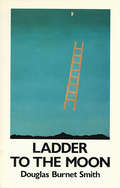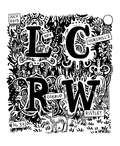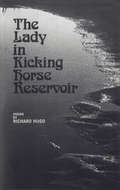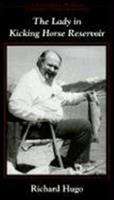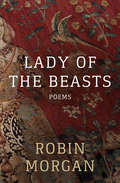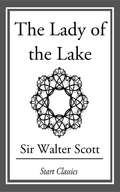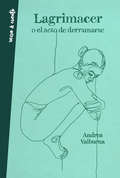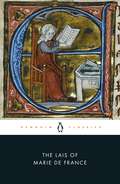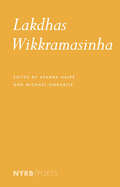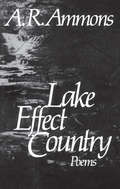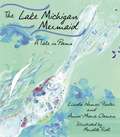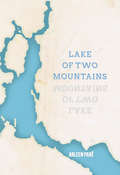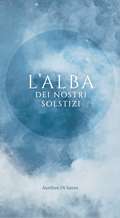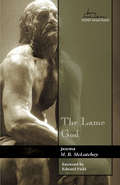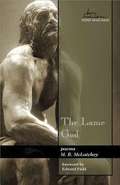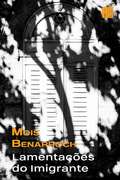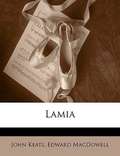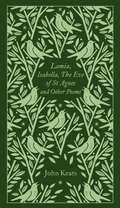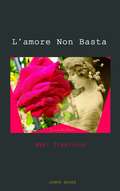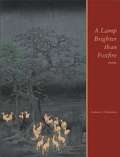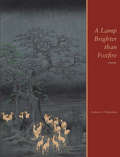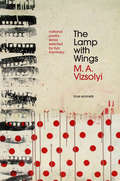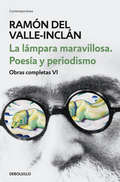- Table View
- List View
Ladder to the Moon
by Douglas Burnet SmithIn his fifth book of poetry, Douglas Burnet Smith tunes his eye and ear closely to the world, conscious of those points where the everyday blossoms into fierce magic. The title sequence is a deftly-rendered homage to the work of Georgia O’Keeffe.
Lady Churchill's Rosebud Wristlet No. 33
by Michael J. Deluca Kelly Link Gavin J GrantGuest edited by Michigan writer Michael J. DeLuca, LCRW #33 approaches its theme of humanity's relationship with the earth with a little humor, a touch of horror, and seventeen different kinds of understanding.<P><P> Includes multiple award winner Sofia Samatar, Nebula and Shirley Jackson award nominee Carmen Maria Machado, and World Fantasy Award nominee Christopher Brown among others.
The Lady in Kicking Horse Reservoir: Poems
by Richard Hugo"Richard Hugo's concern is the unenviable, the unvisited, even the uninviting, which he must invest with his own deprivations, his own private war. The distinctiveness of impulse int he language, the movement organized in single syllables by the craving mind, this credible richness is related to, is even derived from, the poverty of the places, local emanations, free (or freed) to be the poet's own." --Richard Howard "Richard Hugo is such an important poet because the difficulties inherent in his art provide him a means of saying what he has to say. It is no accident that he must develop a negative in order to produce a true image." --Richard Howard
The Lady in Kicking Horse Reservoir
by Richard HugoThe collection includes "Montgomery Hollow," the title poem, and the famous, "Degrees of Gray in Philipsburg," in which he turns to the reader, midway through his description of a dying town, and says, "Isn't this your life? That ancient kiss/ still burning out your eyes? Isn't this defeat/ so accurate, the church bell simply seems/ a pure announcement: ring and no one comes?" His 1973 book, The Lady in Kicking Horse Reservoir, is both about Montana and not about Montana. Of his method, Hugo once said: "Usually I find a poem is triggered by something, a small town or abandoned house, that I feel others would ignore." The poems in The Lady in Kicking House Reservoir are tied to place and landscape, but Hugo's real subject matter remains elusive. From the book jacket: Richard Hugo (1923-1982) was born and raised in White Center, Washington. He flew thirty-three missions in Europe as a bombardier in World War II, receiving the Distinguished Flying Cross. He returned to Seattle to study with Theodore Roethke at the Writing Program. Nominated for the National Book Award. From 1977 to the end of his life, Hugo served as the judge of the Yale Series of Younger Poets competition. Upon publication of The Lady in Kicking Horse Reservoir in 1973, Richard Howard wrote, "Richard Hugo's concern is the unenviable, the unvisited, even the uninviting, which he must invest with his own deprivation, his own private war.... Each poem adds its incisive particulars to the general stoic wreck; but what startles, then reassures in all this canon of the inconsolable, the unsanctified, the dispossessed, is Hugo's poetics, the analogy of language to experience. . . . Richard Hugo is such an important poet because the difficulties inherent in his art provide him a means of saying what he has to say. It is no accident that he must develop a negative in order to produce a true image."
Lady of the Beasts: Poems
by Robin MorganRobin Morgan's second collection of poems is a rich tapestry of female experience, both literal and mythic Daughter, wife, mother, lover, artist, and even priestess are all here in shorter lyrics that cluster around four subjects: blood ties, activism and art, love between women, and archetypes. But Morgan surpasses the political grief and rage she delineated in Monster, her acclaimed first book of poems--especially in the four major metaphysical poems here: "The City of God," balancing grace and despair; "Easter Island," on the ironies of transcendence in embattled love; "The Network of the Imaginary Mother," which became a virtual anthem of the women's movement; and "Voices from Six Tapestries," inspired by the famous Lady and theUnicorn weavings that hang in the Musée de Cluny in Paris. Themes of familial love and hurt, mortality, survival, and transformation inform the poems collected here as the author weaves a wise and powerful self into being. Lady of the Beasts is Robin Morgan at her most lyrical yet.
The Lady of the Lake
by Sir Walter Scott"The Lady of the Lake is a narrative poem by Sir Walter Scott, first published in 1810. Set in the Trossachs region of Scotland, it comprises six cantos, each of which concerns the action of a single day. The poem has three main plots: the contest among three men, Roderick Dhu, James Fitz-James, and Malcolm Graeme, to win the love of Ellen Douglas; the feud and reconciliation of King James V of Scotland and James Douglas; and a war between the lowland Scots (led by James V) and the highland clans (led by Roderick Dhu of Clan Alpine). The poem was tremendously influential in the nineteenth century, and did much to inspire the Highland Revival. By the late twentieth century, however, the poem was virtually forgotten. Its influence is thus indirect: Schubert's Ave Maria, Rossini's La donna del lago (1819), the racist custom of cross burning, the last name of U.S. abolitionist Frederick Douglass, and the song "Hail to the Chief" were all inspired by the poem.
The Lady of the Lake
by Walter ScottThe Lady of the Lake is a narrative poem by Sir Walter Scott, first published in 1810. Set in the Trossachs region of Scotland, it is composed of six cantos, each of which concerns the action of a single day. The poem has three main plots: the contest among three men, Roderick Dhu, James Fitz-James, and Malcolm Graeme, to win the love of Ellen Douglas; the feud and reconciliation of King James V of Scotland and James Douglas; and a war between the lowland Scots (led by James V) and the highland clans (led by Roderick Dhu of Clan Alpine). The poem was tremendously influential in the nineteenth century, and inspired the Highland Revival.
Lagrimacer o el acto de derramarse
by Andrea ValbuenaUn poemario que habla de lo necesario de las despedidas y de la tristeza como acto natural. Un grito que se rebela ante la necesidad actual que nos han impuesto de la felicidad perpetua. «Cada uno de estos poemas es una lágrima. Pequeñas cápsulas redondas y saladas de versos que también se derraman, que brotan, que caen y se escapan de un ojo o a través de un lapicero sujeto por una mano temblorosa. Una mano que escribe y llora, y sabe que de la tristeza también nacen cosas, buenas o malas, pero frecuentemente bellas». La poeta Andrea Valbuena hace en estas páginas un alegato a favor de la tristeza como estado natural y necesario y del duelo como mercromina para el dolor, y nos invita a volver a dar valor a la palabra «lagrimacer» y al acto que denota. La palabra como rebelión y como espejo, llorar sin vergüenza para poder volver a reír. La crítica ha dicho...«Empezó publicando en las redes y ahora es uno de los referentes de la nueva poesía.»ABC «Escribe versos para las mujeres que necesitan recordarse, que son hermosas y eligen quererse a sí mismas antes que a cualquier persona.»El Mundo
The Lais of Marie De France: With Two Further Lais in the Original Old French
by Marie FranceMarie de France (fl. late twelfth century) is the earliest known French woman poet and her lais - stories in verse based on Breton tales of chivalry and romance - are among the finest of the genre. Recounting the trials and tribulations of lovers, the lais inhabit a powerfully realized world where very real human protagonists act out their lives against fairy-tale elements of magical beings, potions and beasts. De France takes a subtle and complex view of courtly love, whether telling the story of the knight who betrays his fairy mistress or describing the noblewoman who embroiders her sad tale on the shroud for a nightingale killed by a jealous and suspicious husband.
Lakdhas Wikkramasinha
by Lakdhas WikkramasinhaBold and original poetry from a leading figure of an underrepresented anglophone tradition.Lakdhas Wikkramasinha is one of the major Sri Lankan poets of the twentieth century. Fearlessly political, &“powerful and angry&” (as Michael Ondaatje calls him in his memoir Running in the Family), Wikkramasinha has influenced generations of writers in Sri Lanka. Yet his work, originally self-published in limited editions, has long been inaccessible. This new volume, edited by Aparna Halpé and Ondaatje, is the first to offer a comprehensive selection of Wikkramasinha&’s English poetry drawn from the original sources, most of which have never been reprinted. It is also the first to contain a representative selection of the poetry that Wikkramasinha composed in Sinhala, now translated into English by Udaya Meddegama. An accomplished bilingual writer, deeply engaged with Sanskrit and Sinhalese traditions, Wikkramasinha also reveals himself to be a modernist shaped by his reading of Federico García Lorca and Osip Mandelstam, bringing a lyric style of great rhythmic force and imagistic compression to bear on his postcolonial present, as well as on the colonial and precolonial past.
Lake Effect Country: Poems
by A. R. AmmonsLake Effect Country is the newest collection by the poet whom the critic Josephine Jacobsen has described as "a formidable and outstandingly original contributor to the best of American poetry." Presenting the National Book Critics Circle Award in Poetry for 1981 to Ammons's A Coast of Trees Richard Locke, editor-in-chief of Vanity Fair, said, in part: "In the thirty years since A. R. Ammons published his first poems, he has fashioned a body of work that achieves a rare amplitude, specific gravity, and high seriousness. He is a poet of the American Sublime—a nature poet, as we say—standing in the tradition of Wordsworth, Emerson, and Whitman. Amidst the hue and cry of contemporary poetical factions, his work pursues its own integrity: clear, unblinking in its self-knowledge, remarkable for its radiant density of argument and feeling."
The Lake Michigan Mermaid: A Tale in Poems (Made in Michigan Writers Series)
by Anne-Marie Oomen Linda Nemec FosterThe Lake Michigan Mermaid is a new tale that feels familiar. The breeze off the lake, the sand underfoot, the supreme sadness of being young and not in control—these sensations come rushing back page by page, bringing to life an ancient myth of coming of age in a troubled world. Freed from the minds of Linda Nemec Foster and Anne-Marie Oomen, the Lake Michigan mermaid serves as a voice of reason for when we’re caught in the riptide. This is a gripping tale in poems of a young girl’s desperate search for guidance in a world turned upside down by family and economic upheaval. Raised in a ramshackle cottage on the shores of Lake Michigan, Lykretia takes refuge in her beloved lake in the face of her grandmother’s illness and her mother’s eager attempts to sell their home following her recent divorce. One day Lykretia spots a creature in the water, something beautiful and inexplicable. Is it the mythical Lake Michigan mermaid, or an embodiment of the stories her grandmother told as dementia ravaged her mind? Thus begins a telepathic conversation between a lost young girl and Phyliadellacia, the mermaid who saves her in more ways than one. Accompanied by haunting illustrations, The Lake Michigan Mermaid offers a tender tale of friendship, redemption, and the life-giving power of water. As it explores family relationships and generational bonds, this book is an unforgettable experience that aims to connect readers of all ages.
Lake of Two Mountains
by Arleen ParéLake of Two Mountains, Arleen Paré's second poetry collection, is a portrait of a lake, of a relationship to a lake, of a network of relationships around a lake. It maps, probes and applauds the riparian region of central Canadian geography that lies between the Ottawa and the St. Lawrence Rivers. The poems portray this territory, its contested human presences and natural history: the 1990 Oka Crisis, Pleistocene shifts and dislocations, the feather-shaped Ile Cadieux, a Trappist monastery on the lake's northern shore. As we are drawn into experience of the lake and its environs, we also enter an intricate interleaving of landscape and memory, a reflection on how a place comes to inhabit us even as we inhabit it.
L'alba dei nostri solstizi
by Aurélien Di Sanzo Ilaria Igieni"L'alba dei nostri solstizi" è una raccolta di 58 poesie che invita il lettore a rifugiarsi fuori dal tempo. In prosa e più raramente in versi, queste poesie vi immergeranno in un'evasione ora fisica ora astratta, spirituale, talvolta persino misteriosa e affascinante. Ogni poesia è stata scritta con un sottofondo di musica ambientale, fonte inesauribile d'ispirazione poetica.
Lambi Barish (A Long Spell of Rain)
by Balraj KomalThis book is an English translation of "Lambi Barish", a volume of selected poems by the famous Urdu poet Balraj Komal. Translated from Urdu by the poet, Balraj Komal.
The Lame God (Swenson Poetry Award #16)
by M. B. McLatcheyWinner of 2013 May Swenson Poetry AwardIn The Lame God, author M. B. McLatchey reminds us of the inevitable bond between art and empathy. With a controlled language that finds its echo chamber in the immortal themes and characters of classical literature, this courageous work accompanies the author on her journey through a parent’s anguish in the face of a horrific crime. Using the art of poetry she gives voice to a suffering—and a love—that might otherwise go unheard. The May Swenson Poetry Award, an annual competition named for May Swenson, honors her as one of America's most provocative and vital writers. During her long career, Swenson was loved and praised by writers from virtually every school of American poetry. She left a legacy of fifty years of writing when she died in 1989. She is buried in Logan, Utah, her hometown.
The Lame God
by M. B. MclatcheyIn The Lame God, author M. B. McLatchey reminds us of the inevitable bond between art and empathy. With a controlled language that finds its echo chamber in the immortal themes and characters of classical literature, this courageous work accompanies the author on her journey through a parent's anguish in the face of a horrific crime. Using the art of poetry she gives voice to a suffering--and a love--that might otherwise go unheard.The May Swenson Poetry Award, an annual competition named for May Swenson, honors her as one of America's most provocative and vital writers. During her long career, Swenson was loved and praised by writers from virtually every school of American poetry. She left a legacy of fifty years of writing when she died in 1989. She is buried in Logan, Utah, her hometown.
Lamentações do imigrante
by Jean Pierre Barakat Mois BenarrochO livro contém poemas autobiográficos do autor que relatam suas várias vivências e sua experiência de se sentir como um imigrante em seu próprio país. O livro original foi publicado em novembro de 2011.
Lamia
by John KeatsThough not one of John Keats' very best poems, Lamia is a major work and essential for anyone interested in him. It has his signature unparalleled beauty but is also unusually thoughtful, with intriguing musings on illusion vs. reality and the nature of love, beauty, and art. Keats' lament about empiricism destroying natural wonder has heavily influenced everyone from Edgar Allen Poe to Richard Dawkins, and Lamia remains central to the art/nature vs. science debate. The story is also interesting in itself; Keats brings a fantasy world vividly to life, draws us in emotionally, and even has a devastating ending. Finally, the poem is impressive technically, showing Keats' growing couplet mastery. One should certainly read his best-known works first, but this should be an early stop; that said, the fact that it is virtually every Keats collection makes a standalone very hard to justify. The important thing at any rate is to read it in some form.
Lamia, Isabella, The Eve of St Agnes and Other Poems (Penguin Clothbound Poetry)
by John KeatsIn the summer of 1820, Keats published this collection, his third and final volume of poetry. A few months earlier, he had started coughing up blood; the following February, he would die of tuberculosis in Rome, aged just twenty-five. This volume contains his greatest work, written in an astonishing burst of creative genius in 1819. It includes 'Lamia', his tale of love and betrayal in ancient Corinth; the haunting medieval romance of 'The Eve of St Agnes'; and his six famous odes, now considered among the most famous verse in the language.
L'amore Non Basta
by Gelsomino walter mattia da silvaNot Enough Love "è la prima collezione di Maki Starfield, che è un'importante poetessa emergente. Una delle più grandi virtù della sua poesia è la sua capacità di ascoltare e identificare i problemi più profondi del nostro tempo, nell'arte e nella critica sociale. Il vigore, la generosità e la saggezza della sua poesia gli conferiscono la categoria di un poeta universale. Inoltre, il fascino delle poesie di Maki Starfield è nel perseguimento della realtà della condizione umana nel mondo dell'illuminazione attraverso l'auto-riflessione nello stile di poesia a 3 linee, basato sull'haiku. Si può dire che il suo mondo sia un prodotto di risonanza delle anime umane in un'unica melodia come un luogo in cui Oriente e Occidente si fondono.
A Lamp Brighter than Foxfire
by Andrew S. NicholsonOpening the space between the ordinary and the visionary, the poems in A Lamp Brighter than Foxfire uncover an intimate relationship with the world, from Las Vegas to Italy to the American Midwest. From a lime glowing in an orchard to a miraculous childhood attempt at levitation, Andrew S. Nicholson's poems ground themselves in the commonplace and leap for the luminous. Central to this collection are poems that retell stories of Jacob from the Old Testament, relocated behind casinos, glimpsed in miniature on kitchen floors, and heard speaking in a moment of decay. Through these retellings, Nicholson examines the creation of self, family relationships, and a generative sense of the divine.
A Lamp Brighter than Foxfire: Poems (Mountain West Poetry Series)
by Andrew S. Nicholson"In Andrew S. Nicholson’s A Lamp Brighter than Foxfire, what is most alive is color, that which gives itself freely, generously: ‘Follow the hopeful as they green the day’ (‘My Garage Fills with an Ever-Increasing Number of Dandelions’). Threaded throughout with Genesis, wherein Jacob wrestles an angel, this gorgeous debut collection builds a ladder firmly rooted here: in sun and earth; in varying and multiple shades of orange; in trials of father and son; in books and paintings; in abandoned casinos; in countries far from home; and/or in the sound of a door closing. Nicholson’s poems come from a man standing by himself, in what George Oppen called the ‘shipwreck of the singular,’ which includes everybody. I’m moved by the luminous generosity, the moral clarity of this work. A Lamp Brighter than Foxfire is news that will stay news.” —Claudia Keelan, author of The Devotion Field, Missing Her, and O, Heart "'Who doesn’t nurse a secret love?' asks Andrew S. Nicholson in visionary poems that reveal secret worlds cradled inside this one. Whether considering the casinos of Las Vegas, a fresco in Pompeii, or scenes from the Hebrew Bible, the poet endures one of desire’s more fraught paradoxes: its unchanging ability to bring change, to turn the known into the unknown. These poems bravely attend to such transformations the way Jacob—the book’s patron saint—wrestles with the angel, 'lifting all the flesh / that he can lose.' I admire this poet who knows that blessing doesn’t arrive without loss, who remembers 'I was loved once. / Beneath that love, a kindness took root.' The same sweet feeling lingers long after this book is closed. Dear reader: savor it." —Brian Teare "Andrew S. Nicholson’s A Lamp Brighter than Foxfire is a gorgeous book. His graceful, playful poems enchant us ('I try to make out the stranger’s face, but he’s shrinking: / a melting gray blur, an ever-smaller thorn.') and transform us ('Sink into the bathwater, any way is a way / to journey toward that joining'). Nicholson has become one of the great poets of a new and radical kind of pastoral." —Joseph Lease Opening the space between the ordinary and the visionary, the poems in A Lamp Brighter than Foxfire uncover an intimate relationship with the world, from Las Vegas to Italy to the American Midwest. From a lime glowing in an orchard to a miraculous childhood attempt at levitation, Andrew S. Nicholson’s poems ground themselves in the commonplace and leap for the luminous. Central to this collection are poems that retell stories of Jacob from the Old Testament, relocated behind casinos, glimpsed in miniature on kitchen floors, and heard speaking in a moment of decay. Through these retellings, Nicholson examines the creation of self, family relationships, and a generative sense of the divine.
The Lamp with Wings
by M. A. VizsolyiA winner of the 2010 National Poetry Series Prize as selected by Ilya Kaminsky (author of Dancing in Odessa, recipient of the 2004 Whiting Award, the Ruth Lilly Fellowship, among other honors, and co-editor of The Ecco Anthology of International Poetry), Vizsolyi's work perpetuates NPS's tradition of promoting exceptional poetry from emerging poets. Kaminksy writes that Vizsolyi's poetry "is erotic the way Catullus was erotic, and Mayakovsky. The voice is arrogant and tender, it goes 'on the nerve,' as Frank O'Hara told us the poet must. This book with knock your socks off. This is real poetry." For thirty years, the National Poetry Series has discovered many new voices and has been instrumental in launching the careers of poets and writers such as Billy Collins, Mark Doty, Denis Johnson, Cole Swensen, Thylias Moss, Mark Levine, and Dionisio Martinez.
La lámpara maravillosa. Poesía y periodismo (Obras completas Valle-Inclán #Volumen 6)
by Ramón del Valle-InclánEl último volumen de las «Obras completas» de Valle-Inclán reúne sus textos periodísticos y poéticos. Recoge este volumen algunas piezas fundamentales para explicarse la trayectoria de Valle-Inclán. Desperdigadas en sus páginas, se halla, además, lo que más se acerca a una «autobiografía intelectual» del escritor. EnLa lámpara maravillosa (1916) éste expuso -en términosdesconcertantes para muchos- su propia estética. EnClaves líricas (1930) reunió la práctica totalidad de su poesía, insuficientemente atendida. Las extraordinarias crónicas de la Gran Guerra anuncian ya la obra de madurez del creador del esperpento, mientras que el conjunto de sus colaboraciones periodísticas conforma un correlato de sus ideas y de sus intereses en el transcurso de casi medio siglo. La crítica ha dicho...«Debemos mantener la sospecha de que Valle-Inclán confió al verso una función de síntesis de su empresa literaria global.»José-Carlos Mainer «Uno de los escritores más importantes de nuestro siglo.»Francisco Umbral «En Valle-Inclán, el radicalismo político y el de la expresión eran simultáneose inseparables: la mejor literatura era también la más irreverente y corrosiva, la más panfletaria.»Antonio Muñoz Molina «Valle-Inclán parece que escribió para nosotros y para quienes vengan después que nosotros, y es al mismo tiempo nuestro predecesor y nuestro contemporáneo.»Antonio Muñoz Molina «Valle-Inclán es el mejor escritor español del siglo XX.» Gonzalo Torrente Ballester«Una poderosa inyección vigorizante para la literatura en idioma castellano.»Juan Carlos Onetti «Valle-Inclán reúne dos cosas que nos son vitales: el no conformismo crítico y el talento creador. Una y otra vez, acertando o chocando, tenemos que seguir y seguir, persiguiendo las propuestas de decoro social y renovación estética que se contienen en la obra de Valle. Nuestroautor mayor de este siglo. El aguijón que no nos dejará dormir hasta haberlo asumido en su plenitud.»Enrique Llovet, El País «El mundo de Valle-Inclán es un universo. De muy pocos escritores se puede decir algo semejante.»Manuel Rivas, El País
